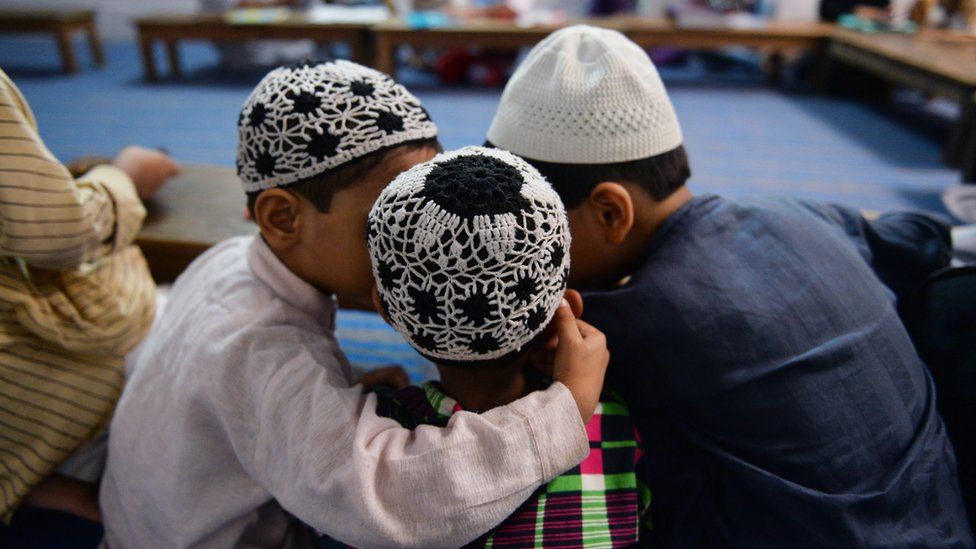- Joined
- Dec 31, 2015
- Messages
- 1,889
- Points
- 83
http://www.bbc.com/news/world-asia-india-42650106
The Indian schoolchildren who are bullied for being Muslim

Image caption The book Mothering a Muslim says children are increasingly being targeted in posh schools for their religious identity
Schools and playgrounds can be dangerous places where children are isolated or bullied. Children often use differences in appearance, skin colour, food habits, misogyny, homophobia and casteism to inflict pain on their peers.
And now, according to a new book out in India, Muslim children are increasingly being targeted in posh schools for their religious identity because of the growing Islamophobia in India and across the world.
Writer Nazia Erum, who spoke to 145 families in 12 cities and 100 children studying in 25 elite Delhi schools while researching her book Mothering a Muslim, says that children as young as five are being targeted.
"What I found during my research was shocking, I didn't think it was happening in these elite schools," Ms Erum told the BBC. "When five and six year olds say they were called a Pakistani or a terrorist, how do you respond to that? And how do you complain to the school?" she asks.
"A lot of it is said in jest, it's meant to be funny, to evoke a laugh. It's subtle and it can seem like harmless banter, but it's not. It's actually bullying and tormenting."
The children she interviewed for her book told her about some of the questions and comments that are regularly hurled at them:
Nearly 80% of India's population of 1.3 billion is Hindu, while Muslims make up 14.2%.
For most part, the two communities have lived peacefully, but religious resentment has always simmered below the surface since 1947 when India and Pakistan were carved out of a single nation. The parting was bloody - between half a million and a million people were killed in religious violence.
Ms Erum says while anti-Muslim slurs have been used since the 1990s, after the demolition of the Babri mosque by Hindu hardline groups and the Hindu-Muslim riots that followed, in recent years their tone and intensity have changed.
She became acutely aware of it in 2014, after she gave birth to her first child.
"As I held my little daughter Myra in my arms, for the first time I was afraid," Ms Erum said, adding that she was worried about even giving the baby a name that could be easily identified as Muslim.
It was a time of sharp religious divisions in India. The Hindu nationalist Bharatiya Janata Party was running a hugely polarising election campaign, which helped sweep Prime Minister Narendra Modi to power.
There was a rise in Hindu nationalist sentiment and some television channels were presenting a distorted narrative that painted Muslims as "invaders, anti-national and a threat to national security".
The Indian schoolchildren who are bullied for being Muslim
- 13 January 2018

Image caption The book Mothering a Muslim says children are increasingly being targeted in posh schools for their religious identity
Schools and playgrounds can be dangerous places where children are isolated or bullied. Children often use differences in appearance, skin colour, food habits, misogyny, homophobia and casteism to inflict pain on their peers.
And now, according to a new book out in India, Muslim children are increasingly being targeted in posh schools for their religious identity because of the growing Islamophobia in India and across the world.
Writer Nazia Erum, who spoke to 145 families in 12 cities and 100 children studying in 25 elite Delhi schools while researching her book Mothering a Muslim, says that children as young as five are being targeted.
"What I found during my research was shocking, I didn't think it was happening in these elite schools," Ms Erum told the BBC. "When five and six year olds say they were called a Pakistani or a terrorist, how do you respond to that? And how do you complain to the school?" she asks.
"A lot of it is said in jest, it's meant to be funny, to evoke a laugh. It's subtle and it can seem like harmless banter, but it's not. It's actually bullying and tormenting."
The children she interviewed for her book told her about some of the questions and comments that are regularly hurled at them:
- Are you a Muslim? I hate Muslims.
- Do your parents make bombs at home?
- Is your father part of the Taleban?
- He's a Pakistani.
- He's a terrorist.
- Don't piss her off, she will bomb you.
Nearly 80% of India's population of 1.3 billion is Hindu, while Muslims make up 14.2%.
For most part, the two communities have lived peacefully, but religious resentment has always simmered below the surface since 1947 when India and Pakistan were carved out of a single nation. The parting was bloody - between half a million and a million people were killed in religious violence.
Ms Erum says while anti-Muslim slurs have been used since the 1990s, after the demolition of the Babri mosque by Hindu hardline groups and the Hindu-Muslim riots that followed, in recent years their tone and intensity have changed.
She became acutely aware of it in 2014, after she gave birth to her first child.
"As I held my little daughter Myra in my arms, for the first time I was afraid," Ms Erum said, adding that she was worried about even giving the baby a name that could be easily identified as Muslim.
It was a time of sharp religious divisions in India. The Hindu nationalist Bharatiya Janata Party was running a hugely polarising election campaign, which helped sweep Prime Minister Narendra Modi to power.
There was a rise in Hindu nationalist sentiment and some television channels were presenting a distorted narrative that painted Muslims as "invaders, anti-national and a threat to national security".

